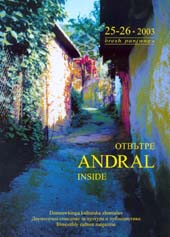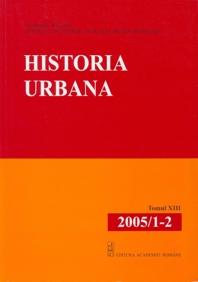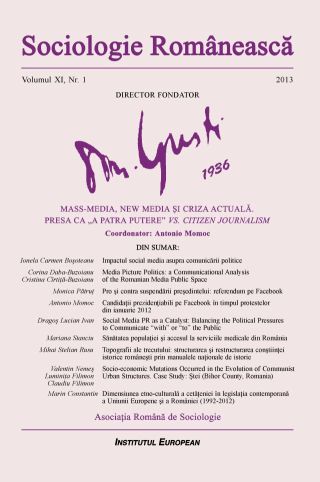
We kindly inform you that, as long as the subject affiliation of our 300.000+ articles is in progress, you might get unsufficient or no results on your third level or second level search. In this case, please broaden your search criteria.


















Raed Arafat’s resignation from his position of Secretary of State within the Ministry of Health on January 10th 2012 ignited the political crisis that took place in January-February 2012 and led to a series of street protests, which culminated when the Emil Boc Government resigned on February 9th 2012. The newness of these street movements that happened in Romania’s large cities consisted in the online mobilization of the protesters. The citizens showed online their solidarity with Raed Arafat, the medic who opposed the Government’s intentions to change the Sanitary System Law. According to the Secretary of State, the reform would have liberalized the health services, which would have affected the low income population, as well as the Public Emergency Ambulance Service. The social networks users organized in online communities of supporters, and the members of these groups settled and communicated online the time and meeting place where they gathered to shout anti-governmental and anti-presidential slogans every evening. The Romanian politicians, especially the potential candidates for the 2014 presidential elections, have not remained indifferent. Most of them reacted in an effort to improve their image and their level of trust among the protesters, who have organized themselves through social media. Using the content analysis method applied on the politicians’ official Facebook accounts, this article presents the quick reactions, and the image and communication strategies that the presidential candidates resorted to during the protests started on the social networks in January 2012.
More...
Sensuous public relations practices, the activity through which dialogue and communication is shaped, transmitted and disseminated. In its different ways, PR conceptualizes societal evolution as inter-woven with social practices; and those practices, in turn, shape its activity. PR arises among distinctive social groups and institutions, between a political figure and its constituency, on the basis, and as a response to given conditions and relationships. It is in the presence of these conditions Romanian PR practitioners have to handle and respond to the conditions of existence. We engage in quantitative and qualitative research Romanian PR practitioners so as to understand the impact of social media in Romanian PR political campaigns. We seek to place PR practitioners within a new society conceived as a complex expressive entity with new demands out of its political figures, and in consequence, in need of new PR instruments and solutions. There are, of course, some unresolved problems and some new threats for both Romanian PR practitioners and Romanian political figures, not least of which is the unevenness of dialogue between public and political figure. We alert to the assumption about the channels of communication with the young community, apparently disengaged from civic participation and disillusioned by political figures.
More...
Facebook has proved to be an efficient means of political communication between citizens and politicians. On this virtual stage, political actors display their competence, consolidate their fame, mobilize their volunteers and attack their political opponents, encourage donations and debate some sensitive issues of the society. Citizens have the chance to get informed, to organize and to mobilize themselves for different causes or candidates, to participate in different events or elections campaigns. Our study will analyze the use of Facebook during the election campaign for the impeachment referendum (July 29, 2012). The analysis will focus on the posts made both by the pro-Băsescu citizens and by those that are against. The research questions addressed will focus on: a) the types of information posted by both opponent groups; b) the degree in which the Facebook accounts are used for acclaims, attacks or defenses; c) the time span during the election campaign in which „the dialogue” between the two groups gets more intense; d) the degree of interactivity between those who post the information and their „friends”. The research methods are functional analysis and content analysis. The two opponent groups sent their messages by the use of photographic images, verbal texts and advertising images. They used more attacks than acclaims, and had an intense activity during the middle and the end of the campaign. Their Facebook pages were interactive allowing the posting of appreciations, comments and the distribution of the materials posted.
More...